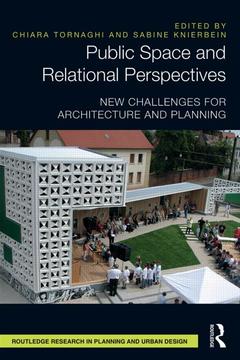Description
Public Space and Relational Perspectives
New Challenges for Architecture and Planning
Routledge Research in Planning and Urban Design Series
Language: English
Subjects for Public Space and Relational Perspectives:
Keywords
Contested space; Social justice; Arab spring; Occupy movement; Lefebvre; MIT Medium Lab; Digital Public Spaces; Contract Contract Contract; Uwe Altrock; Contract Contract Contract Contract; Contract Contract Contract Contract Contract; Community Based Learning; Contract Contract; Information Infrastructure; National Library; Open Source Software; Game Developers; Bronze Soldier Monument; Relational Public Space; Public Administration; Action Orientated Pedagogy; Open Source Movements; Exive Approaches; Bronze Soldier; Critical Urban Studies; Lefebvre 2009b; Digital Commons; Contemporary Societies; Smart Phone; Simulation Game
Publication date: 10-2014
Support: Print on demand
Publication date: 08-2016
· 15.6x23.4 cm · Paperback
Description
/li>Contents
/li>Readership
/li>Biography
/li>
Traditional approaches to understand space tend to view public space mainly as a shell or container, focussing on its morphological structures and functional uses. That way, its ever-changing meanings, contested or challenged uses have been largely ignored, as well as the contextual and on-going dynamics between social actors, their cultures, and struggles. The key role of space in enabling spatial opportunities for social action, the fluidity of its social meaning and the changing degree of "publicness" of a space remain unexplored fields of academic inquiry and professional practice.
Public Space and Relational Perspectives offers a different understanding of public spaces in the city. The aim of the book is to (re)introduce the lived experiences in public life into the teaching curricula of those academic disciplines which deal with public space and the built environment, such as architecture, planning and urban design, as well as the social sciences.
The book presents conceptual, practical and research challenges and brings together findings from activists, practitioners and theorists. The editors provide eight educational challenges that educators can endorse when training future practitioners and researchers to accept and to engage with the social relations that unfold in and through public space.
Cover image: KARO*
1. Relational Public Space. New Challenges for Architecture and Planning Education (Sabine Knierbein and Chiara Tornaghi), Part I. Conceptual Challenges. Re-addressing public space in a relational perspective (Chiara Tornaghi and Sabine Knierbein), 2.Relational Ontology of Public Space and Action-orientated Pedagogy in Action: Dilemmas of Professional Ethics and Social Justice (Chiara Tornaghi), 3.Public Space as Relational Counter Space – Scholarly Minefield or Epistemological Opportunity? (Sabine Knierbein), Part II. Practical Challenges. Exploring Innovative Tools in Teaching Architecture and Planning (Sabine Knierbein and Chiara Tornaghi), 4. Creating Mobile Media and Social Change? (StefanieWuschitz), 5. A Gaming Layer Entwined into the Everyday Life of Public Space (JörgHofstätter, Jochen Kranzer and Tihomir Viderman), 6. Playfully Creating Public Spaces of Opportunity (Wolfgang Gerlich and Emanuela Semlitsch), Part III. Research Challenges. Innovating Curricula by Learning from Lived Space (Sabine Knierbein and Chiara Tornaghi), 7. Public Spaces, Experience and Conflict: The Cases of Helsinki and Tallinn (Panu Lehtovuori, Andres Kurg, Martina Schwab and Siri Ermert), 8. Cultural Interventions in Urban Public Spaces and Performative Planning – Insights from Shrinking Cities in Eastern Germany (Uwe Altrock and Sandra Huning), 9. From Classrooms to Learning Landscapes. New Socio-spatial Imaginaries of Learning and Learning Spaces (Ian Banerjee), Conclusion 10. Educational challenges (Sabine Knierbein and Chiara Tornaghi
Chiara Tornaghi is Researcher and Teaching Fellow at the School of Geography, University of Leeds, UK. In 2009, she was the City of Vienna Junior Visiting Professor at the Centre for Public Space and Urban Culture (SKuOR), Vienna University of Technology, Austria.
Sabine Knierbein is Assistant Professor for Urban Culture and Public Space (tenure track) at the Department of Spatial Planning, Faculty of Architecture and Planning at Vienna University of Technology, Austria. She has directed the Interdisciplinary Centre for Urban Culture and Public Space since 2008.




